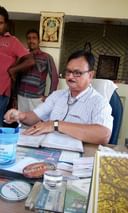Schistosomiasis: Treatment, Cost and Side Effects
Last Updated: Jan 20, 2025
What is the Schistosomiasis?
Schistosomiasis is a severe disease that occurs as a result of infection caused by parasitic worms. Infection along with the presence of S. haematobium, S. Japonicum and Schistosoma mansoni cause is the reason for a number of illnesses in human body. The infection will take place in freshwater that has become contaminated comes into contact with skin. In such freshwater sources the contamination occurs as a result of the presence of snails carrying the schistosomiasis diseases. When infected humans excrete in the water the schistosoma eggs get released and when the eggs start to hatch, the parasites will grow and multiply within the body of the snails. After they have developed and multiplied the parasites exit the body of the snail and move around in the water. When people swim or wash in the freshwater the parasites enter the body through the skin. Within weeks the parasites will grow into adult worms thus inhabiting within the blood vessels. The female worms will start producing eggs in the blood vessels. A part of these eggs will travel to the intestine and finally move out from the body through urine and or stool.
Signs and symptoms of infection include rashes or itchiness of the skin. Fever, cough and cold, chills and muscle cramps can start to develop in a month’s time of the onset of the infection. During the very early phases of infection people show little or no symptoms. If children are infected with the schistosoma eggs they may start to develop conditions such as malnutrition, difficulties with learning and anaemia. Over time due to repeated infections the infected person’s organs such as the intestine, lungs and liver may become severely damaged. The schistosoma eggs can in very rare cases be found within the spinal cord of the brain. When this happens the infected person will become susceptible to paralysis, seizures and even the inflammation of the spinal cord.
How is the Schistosomiasis treatment done?
If you are under the suspicion that you may be infected with schistosomiasis as the result of the signs and the symptoms, then it is advised that you schedule a visit with your doctor. He or she will ask you to samples of your urine or the stool particles in order to check for the presence of the parasites. The physician might also consider taking your blood sample to check for the infection. In order to get exact results the doctor might ask you to wait for around a month or two following exposure to water that has been contaminated.
Recently, a PCR or Polymerase Chain Reaction test is more in use to confirm the results of the test better. Other procedures may also be prescribed in case eggs are not found in the urine or the stool. In order to collect tissue biopsy, methods such as colonoscopy, cystoscopy, liver biopsy and endoscopy may also be prescribed. In order to determine the degree of the infection you may need to undergo medical procedures such as Chest X-rays, CT scan, ultrasound, echocardiograms and MRI.
For people who are infected with schistosomiasis, they may be prescribed praziquantel which though effectively destroys the adult worms, it fails to have any effect on the eggs or the immature worms. The dose will be determined taking into thought the weight of the patient. The drug rapidly disintegrates the worm, making it weak enough for the human system to attack the worm.
Who is eligible for the treatment? (When is the treatment done?)
People who inhabit regions with source of freshwater that is said to be contaminated with Schistosoma are eligible for treatment in case they start to show signs and symptoms of the infection. People who have suffered from schistosomiasis infection a number of times before and are still suffering, should seek help from your doctor, in case you feel that your symptoms of abdominal pain, bloody diarrhoea, seizures, and shortness of breath have increased.
Who is not eligible for the treatment?
People who are allergic to the ingredients contained within the drugs are not eligible to go for treatment and should consult with their physician regarding alternative treatment possibilities.
Are there any side effects?
People who are infected with schistosomiasis will be prescribed to take praziquantel which is an anti-worm drug. Adverse reactions of this medication include dizziness, reduced appetite, headache, nausea, weakness, skin rash and fever. Some rare reactions include high fever, irregular heartbeat, seizures and bloody diarrhoea.
What is the price of the treatment in India?
In India the price of one strip of Praziquantel containing eight tablets can cost you around Rs.350. The price of a chest x-ray can cost you around Rs. 250, ultrasound around Rs.450 and MRI cost varies between Rs.1000- 25000.
What are the alternatives to the treatment?
The alternative treatment for Schistosomiasis involves herbal remedies such as drinking a glass of water mixed with a drop of black walnut oil or having freshly prepared clove tea twice a day or drinking a glass of warm water containing crushes leaves from the olive tree.
Table of content
15+ Years of Surgical Experience
All Insurances Accepted
EMI Facility Available at 0% Rate
Find General Physician near me
Ask a free question
Get FREE multiple opinions from Doctors

